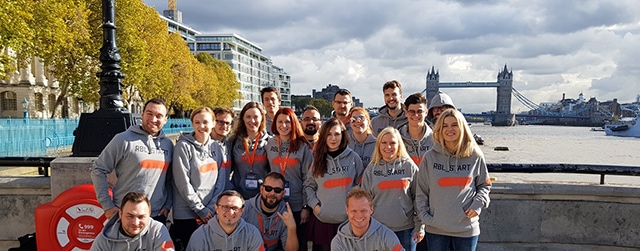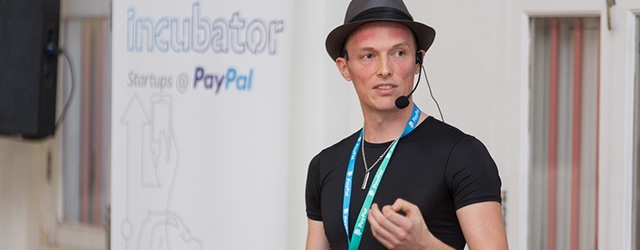Though still relatively new themselves, the world’s top fintech labs are helping startups, banks and governments devise fresh solutions and uncover untapped opportunities.

This era of unprecedented technological advancement presents financial institutions with both opportunities and challenges. For every application programming interface (API) that helps banks more efficiently process business-to-business (B2B) payments, a cloud-based disruptor offers point solutions for lending, eating into bank profits. Easier cross-border payment systems enable faster business but increase security risks. Analytics coupled with big data help banks coalesce client information into a single customer view, but that view may run afoul of EU General Data Protection Regulation (GDPR) mandates.
Not surprisingly, organizations turn to financial technology—fintech—to meet the challenges posed by digitization and to help capture the significant opportunities it presents. This year, Global Finance set out to identify the technology labs—or hubs, or incubators, or accelerators—that are setting the pace when it comes to nurturing innovation in finance. We cast a wide net, putting a call out to our global network of reporters and sources for informal nominations. We then vetted our initial list to weed out mere co-working spaces—our honorees had to demonstrate an active program of startup support and a focus on fintech. Most fintech labs are relatively young, launched within the past five years, so we further narrowed the list to labs with some track record of successful startup “graduates.” Then we dove even more deeply, considering metrics such as the strength of each hub’s ecosystem of partners and supporters and the extent to which it provides funding or access to funders.
The 25 hubs that emerged from this process as Global Finance magazine’s Best Financial Innovation Labs 2019 all strive to develop and deploy new technologies to better serve B2B banking customers, increase profits, improve compliance efforts, improve security and reduce infrastructure costs. What follows in these pages isn’t a ranking, but a bundling of the world’s most effective fintech supporters. Some are run by banks, others by venture capital (VC) firms or economic development agencies and independent organizations. What they share is a vision of collaborative creation to deliver meaningful advancements to society.

Joerg Landsch, Deutsche Bank’s head of Innovation for the Americas, believes that the most successful innovation centers balance “real-life opportunities today with the possibilities of tomorrow.” While he envisions a time when quantum computing will radically alter banking, he seems equally excited about a recent innovation that helps Deutsche Bank better handle the truckloads of paper regularly delivered to its document custody center.
Previously, Deutsche Bank employees had to manually process those documents on behalf of the bank and its clients—a costly, time-consuming and cumbersome operation. After studying the problem, Deutsche Bank Innovation Labs reached out to startups specializing in artificial intelligence (AI) and robotic automation. Working with the bank’s business, technology and operations arms, the lab assessed several solutions before settling on one offered by the New York City–based WorkFusion. Employing cognitive automation technology, this solution has dramatically reduced the amount of human intervention required to process paper documents, increasing profitability in the process.
Still, innovators can’t help but envision the future.
For Ram Shoham, co-founder of Accelerator Frankfurt, the future is blockchain. After five sessions focusing on an array of fintech offerings, Accelerator Frankfurt will now concentrate on this dispersed-ledger technology, the underpinning of cryptocurrencies such as bitcoin. Shoham believes that by tokenizing assets—or digitally listing and storing rights to an asset that would otherwise be difficult to transfer via cash or cash equivalents—blockchain will open up entirely new asset classes to investors.
“Now you invest in stocks, in bonds, in savings. You have cash,” Shoham says. “With blockchain, we’re going to see big new possibilities open up in real estate, in art, in technology. We’re going to be able to tokenize all these different investments that have not been available to retail investors before.”
Mike Todasco, director of Innovation for PayPal Innovation Lab, looks even further down the line. More than 20 million small and midsize enterprises (SMEs) now use PayPal as their payment system. Todasco envisions upping sales via augmented reality. Imagine watching a movie, and all the products shown in that movie are tied to a database. You like the actress’s shoes? The curtains in the hero’s bedroom? You pause the movie, click on the goods, and are linked to sites selling these products.
World’s Best Financial Innovation Labs 2019 |
|
|---|---|
Lab |
City |
| Accelerator Frankfurt | Frankfurt |
| Alior Bank RBL | Warsaw |
| Barclays Accelerator | London, Tel Aviv, New York |
| Beta-i | Lisbon |
| BNY Mellon Global Innovation Centers | London, Chennai, Pune, Singapore, Silicon Valley, Pittsburgh, Pennington, Jersey City, Oriskaney |
| boostLAB Powered by BTG Pactual | Sao Paulo |
| Capital One Labs | Washington, DC, New York |
| Citi Innovation Labs | Dublin, Tel Aviv, Singapore, Mexico City, London, San Francisco |
| Cyberport | Hong Kong |
| DBS Asia X (DAX) | Singapore |
| Deutsche Bank Innovation Labs | Silicon Valley, Berlin, New York, London, Singapore |
| DIFC Fintech Hive | Dubai |
| Fidelity Center for Applied Technology/Fidelity Labs | New York |
| FinLab AG | Frankfurt |
| Fintech Innovation Lab | New York, London, Hong Kong |
| FIS Global – FIS Financial Inclusion Lab | Bengaluru |
| LUISS Enlabs | Rome, Milan |
| OTP Bank Innovation Lab | Budapest |
| PayPal Innovation Lab | Singapore, San Jose, Scottsdale, Chennai |
| Santander InnoVentures | London |
| Startupbootcamp — FinTech | Amsterdam, Cairo, Cape Town, Chengdu, Dubai, Hartford, London, Melbourne, Mexico City, New York |
| Synechron — FinLabs | Amsterdam, New York, Charlotte, Fort Lauderdale, London, Dubai, Hyderabad, Bengaluru, Pune, Serbia, Singapore, Paris |
| TechQuartier | Frankfurt |
| Wells Fargo Startup Accelerator | New York |
| YES Fintech | Mumbai |
Lab? Hub? What Is It?
While there are no standard definitions differentiating a fintech “lab” from an “incubator,” from an “accelerator,” in general:
•Aninnovation labis a co-working space that typically offers startups mentoring, education and support from corporate partners. The lab may focus on one area of innovation or have different programs in several areas of concentration. These programs seek to help participants develop breakthrough solutions for entrenched problems.
•Astartup acceleratoroperates much like an innovation lab, but it also seeks to speed the time to market for a product or service. It typically provides seed money to the startup in exchange for a stake in the company. These funds may be invested directly by the accelerator or by companies in the accelerator’s network.
|
BANK-SPONSORED CENTERS |
|---|
In these labs and accelerators, banks work with outside startups—and sometimes internal teams, as well—to solve challenges faced by the banks themselves and by bank customers.
Barclays Accelerator, Powered by Techstars
Barclays Accelerator, Powered by Techstars is a partnership program between the bank and the Boulder, Colorado–based Techstars seed accelerator. Thirteen-week programs are run in Barclays facilities in New York, London and Tel Aviv. These programs connect startups to investment opportunities and also provide mentorship and marketing support. In exchange, Barclays takes a 2% share of the company, and Techstars takes 4%. The accelerator concentrates on fintech innovation in the fields of cybersecurity, AI, wealth management, investment banking, big data and cryptocurrency. Recent startups accelerated have focused on fraud detection, bank automation, blockchain and improving the risk posture of online banks.
boostLAB—Powered by BTG Pactual
Based in Sao Paulo, BTG Pactual is the largest investment bank in Latin America. According to the corporate website, its boostLAB accelerates “advanced-level startups with great potential for growth.” It works with these startups to create new products and services for the bank and for BTG Pactual’s suppliers and partners. The lab provides mentorship and work space. Areas of interest include machine learning, analytics, the internet of things (IoT) and blockchain. Thus far, boostLAB has accelerated more than 200 startups. While boostLAB does not offer funding, investments are sometimes negotiated between startups, BTG Pactual and other interested parties.
Citi Innovation Labs
Citi Innovation Labs are located in Ireland, England, Israel, Singapore and Mexico. Accelerator programs run for four months. Different labs focus on different product types. Israel, for example, concentrates on AI for capital markets. The Ireland lab focuses on corporate payment products. Citi Ventures, the VC arm of Citigroup, invests in startups that accelerate the adoption of new technologies for Citi and its clients. Focus areas include analytics, machine learning, payment infrastructure, and security.

DBS Asia X (DAX)
DBS Bank found the hiring process to be time consuming and repetitive. So it deployed the Jobs Intelligence Maestro, Southeast Asia’s first virtual bank recruiter. Powered by AI, the Jobs Intelligence Maestro helps automate the hiring process, shortlisting candidates for in-person interviews.
The Jobs Intelligence Maestro is a result of the work being done at DBS Asia X (DAX), an arm of DBS Bank. DAX was launched in 2016. One of the largest innovation labs in Singapore, it operates out of a 16,000-square-foot co-working space. DAX has thus far matched 21 startups with operating units inside the bank and with the bank’s SME clients.
The DAX facility offers a host of startup programs. The Startup Xchange allows startups to work with DBS personnel to cocreate solutions focused on AI, data science, immersive media and the IoT. DAX U offers fintech workshops and information sessions. DAX Conversations feature interviews with leaders in different fields of banking technology.
Deutsche Bank Innovation Labs
Deutsche Bank’s five innovation labs are located in Europe, Asia and North America. Primarily, they strive to improve bank business. To accomplish this, the labs identify bank challenges and work with startups that can help address those challenges. Startups receive access to Deutsche Bank decision-makers and influencers, resources to develop products and services, and support integrating their technologies into the bank’s ecosystem. The labs also test technologies against real-world banking requirements.
OTP Lab
In Budapest’s OTP Lab—an arm of the OTP Group—fintech startups and scale-ups undergo a 12-week program designed to help them build bank solutions. OTP professionals and outside experts work with these companies to help them refine their products. Business validation, customized mentorship, co-working space, access to OTP APIs and potential access to 18 million OTP Bank customers are also provided. At program’s end, startups and scale-ups meet with representatives of PortfoLion Venture Capital Fund, part of OTP’s VC arm, and sometimes receive funding from that organization.

RBL_START
Andrzej Dominiak, head of the RBL_START innovation center, thinks people don’t need banks anymore. It’s an interesting concept for Dominiak to express: RBL_START is an arm of the Warsaw-based Alior Bank. Nonetheless, Dominiak, who is Alior’s chief Innovation officer, believes banks are giving way to innovative financial and insurance platforms that can help to virtually and more conveniently connect both businesses and consumers to the financial products and services they need.
For example, an early-stage platform now in use at the bank connects SME clients to financial services from Alior Bank and from its competitors—and allows users to apply for products from these different financial institutions. The platform also enables users to buy services from each other: An SME looking for accounting services, for example, can connect with accounting firms.
This platform is a product of the RBL_START innovation center. Beginning its second session at the time of this writing, the accelerator matches mature startups with bank departments and with Alior Bank customers with expressed fintech needs. RBL_START’s first session focused on open banking, blockchain and robo-advisory services. In 2019, RBL_START plans to work with companies operating in the fields of data analytics, customer engagement and security improvement. Companies receive mentoring from Alior Bank and RBL_START partner PZU, the largest insurer in Poland. They also have access to the bank’s developer portal and a sandbox environment designed to help companies align their products with EU regulatory requirements. Selected businesses develop proofs of concept for possible implementation in banking or insurance. In addition to PZU, partners include the Warsaw Stock Exchange, IBM, Mastercard, Google Cloud, Amazon Web Services and Microsoft.
Wells Fargo Startup Accelerator
In its nearly five years of operation, the Wells Fargo Startup Accelerator has received 2,000 applications from companies in more than 50 countries. It has accepted roughly two dozen, operating inside and outside of fintech. The six-month accelerator connects startups with a global network of business mentors, venture capitalists and financial executives. Upon completion of the accelerator, some startups may be offered the chance to work with different lines of business within the bank. In exchange for an investment of up to $1 million, Wells Fargo Startup Accelerator takes a minority stake in each company.
YES FINTECH
Founded in 2004, YES BANK has grown into India’s fourth-largest private-sector bank. It is based in Mumbai and specializes in corporate, institutional and commercial banking. YES Fintech is the bank’s startup and scale-up accelerator. It provides startups with equity of up to US$1 million—without claiming a stake in the company—to create solutions for bank customers. Areas of concentration include process automation, smart decision-making, big data and analytics, cybersecurity, trade finance platforms and alternate credit decision-making.
|
IN-HOUSE INNOVATION LABS |
|---|
These innovation centers typically don’t work with outside startups. Instead, they gather innovators from within the financial institution’s ranks to design new fintech products and services.
BNY Mellon Global Innovation Centers
BNY Mellon’s history of innovation dates to the 1970s, when the bank became an inaugural member of the Society for Worldwide Interbank Financial Telecommunications (SWIFT). BNY Mellon Global Innovation Centers, founded in 2014, build on that tradition. In its nine locations—five in North America, three in Asia and one in Europe—BNY Mellon professionals incubate new ideas, experiment with new technologies to create new products and services for our clients. These innovators work with our clients, ecosystem partners as well as technology companies, big and small, to incubate solutions in the areas such as client experience, data solutions and insight delivery, to name a few.
Capital One Labs
Capital One Labs are located in New York City and Arlington, Virginia. Labs build fintech products and services designed to advance Capital One business. Projects include improving fraud detection and building a platform to simplify the modeling processes needed for machine learning.
Fidelity Labs
Founded in 1999, Fidelity Labs now has 150 people working in eight locations. Together, Fidelity Labs’ product managers, designers, developers and engineers identify emerging opportunities for the bank. These innovators then imagine ways to capture those opportunities. They develop new ideas, test those ideas and build prototypes. In the process, Fidelity Lab professionals have thus far secured more than 200 patents. Areas of study include virtual reality, blockchain, AI and wearables. The labs also host events for high school and college students.

PayPal Innovation Lab
The PayPal Innovation Lab operates in four cities: Singapore; San Jose, California; Scottsdale, Arizona; and Chennai, India. The lab “is focused on internal innovation, on increasing the quality of ideas from employees across the company, and on raising the bar for ideation,” says Mike Todasco, director of Innovation. Since PayPal caters to SMEs, the lab works to develop solutions requiring a deep technical expertise that smaller businesses often don’t have in-house. Areas of concentration include information security, payment infrastructures, risk and compliance, digital payments and customer profiling.
To generate and implement fintech products and services, PayPal Innovation Lab collaborates with local universities for research and development. It partners with trade associations, chambers of commerce and other organizations to run fintech-centered workshops for SMEs. It also provides fintech training materials and outreach to institutes of technical education. The lab’s most significant presence is in Singapore, where tech students can work part-time in the lab, learning how to “solve the real business problems we work on at PayPal,” Todasco says.
|
VENTURE CAPITAL ACCELERATORS |
|---|
These VC firms fund innovative fintech startups and scale-ups, using networks and savvy as well as money to boost long-term prospects for success.
Accelerator Frankfurt
Accelerator Frankfurt is a VC and private equity firm offering a four-month, go-to-market program for B2B fintechs, along with startups operating in the fields of cybersecurity and insurance, among others. The go-to-market program is competitive: Accelerator Frankfurt scouts more than 500 startups each year, and only between five and eight are selected. Co-founder Ram Shoham says startups are chosen based on the stated needs of Accelerator Frankfurt’s broad network of banking contacts.
The accelerator offers startups mentorship, co-working spaces and professional services including strategy consulting, legal consulting and marketing. It strives to have each startup develop a proof of concept by program’s end. Seventy percent of startups accelerated find companies to fund their projects. Accelerator Frankfurt sometimes provides direct funding as well, and has recently started a €50 million (US$56.2 million) seed investment fund for blockchain startups.
FinLab AG
FinLab AG describes itself as a fintech “company builder and investor.” This VC firm, based in Frankfurt and listed on the Frankfurt Stock Exchange, houses both an in-house fintech incubator and an incubator for outside fintech startups based in Germany. Its aim is to scale those companies’ products and services beyond Germany to the greater European, then global, banking marketplace. It also selectively invests in US and Asian fintech incubators and investment funds.
LUISS EnLabs
LUISS EnLabs is a Rome-based accelerator. It is operated by the publicly listed LVenture Group in conjunction with Luiss Guido Carli University. Founded in 2013, it now hosts two five-month accelerator sessions each year, both focusing on early-stage startups. Thus far, it has accelerated more than 60 companies, providing each with mentoring, management and opportunities for investor networking. It has facilitated funding for 80% of the companies enrolled in its accelerator, for a total of €44 million. About €11 million of this has come directly from LVenture Group, which seeds each startup completing the accelerator with an investment of up to €145,000. The rest has come from other VC firms and angel investors that LUISS EnLabs has connected to its startups. LUISS EnLabs takes a 9% stake in each company accelerated.
Santander InnoVentures
Santander InnoVentures is based in London. It is the VC arm of the Santander Group commercial bank. In 2014, Santander InnoVentures created a US$100 million fund to support the Santander Group’s innovation agenda. Its goal is to help fintech companies leverage Santander InnoVentures’ brand, network and know-how to grow their businesses. Santander InnoVentures provides these startups with access to world-class industry experts and to technology teams that give startups the technical support necessary to scale operations. It also helps startups scout local talent in the markets where those startups want to operate. The fund’s investment committee determines which startups receive investment.
Startupbootcamp
Startupbootcamp is a network of seed accelerators that support startups in more than 20 industries, including fintech. It was founded in Copenhagen in 2010 and has grown into a network of 19 startup accelerators and four scale-up accelerators worldwide. Thus far, Startupbootcamp has seeded 727 startups (30% of which are female led) with more than €500 million in funding. Accelerator programs last for three months, during which time startups collaborate with a network of partners, mentors and investors. Startupbootcamp boasts a broad ecosystem of partners and investors. Investor partners for fintech programs include Visa, HSBC Mexico, Deloitte, Cisco, Pride Capital and AWS.
Startupbootcamp’s fintech accelerators operate in locations that include Amsterdam, Mexico City, Cairo, Melbourne and Dubai. Focus areas include privacy and GDPR compliance, authentication, asset and wealth management, blockchain and cybersecurity.
|
INDEPENDENT HUBS |
|---|
These innovation centers are unaligned with banks or VC firms. Some arise from consultancies or university departments with close ties to the financial industry.
Beta-i
Beta-i is based in Lisbon. An organization created to boost entrepreneurship, Beta-i helps new and established businesses grow by offering 360º innovation services in the fields of acceleration, corporate innovation and education. It also runs Lisbon Challenge, one of Europe’s most active startup accelerators. Since 2010, Lisbon Challenge has accelerated more than 970 startups that have together raised more than €80 million in funding. Beta-i also supports a fintech-only program called the SIBS Payforward Accelerator. (SIBS International is a payment-services company.) Areas of concentration include AI, cybersecurity, blockchain, open banking APIs and big data.
FIS Global—FIS Financial Inclusion Lab
FIS Global provides financial services and payment technologies to the banking industry. Its Financial Inclusion Lab is an in-house operation based in Bengaluru, India. The lab strives to develop fintech solutions to serve the unbanked. To do so, it collaborates with governments, nongovernmental organizations and business leaders. Lab innovations include the Doorstep Banker, a piece of technology carried by bank employees that enables them to execute in-the-field banking transactions.
Synechron FinLabs
Synechron is an IT and consulting company based in New York and operating in 18 countries worldwide. Synechron helps financial services and insurance companies implement digital transformation strategies. According to its corporate website, the company earns more than US$500 million in annual revenue and employs about 8,000 people. Its FinLabs component consists of 12 labs globally and a partner ecosystem including powerhouses such as Microsoft. Acceleration programs focus on blockchain, AI, wealth tech and other subjects. Specific areas of concentration include client prospecting, know-your-customer compliance, blockchain use for margin calls and international payment systems.
TechQuartier
TechQuartier, based in Frankfurt, bills itself as “a creative arena and melting pot for entrepreneurs and innovators from the financial industry and beyond.” It has thus far helped 90 startups in nine industries raise more than €1 billion in total funding. Fintech companies account for 44% of its startups.
|
DEVELOPMENT-ORIENTED INNOVATION CENTERS |
|---|
These fintech innovation centers are run by governments, nongovernmental organizations and economic development organizations.
Cyberport
Owned by the government of Hong Kong, Cyberport is an economic development agency charged with developing the tech industry in that city. So far, it has supported more than 1,000 tech companies in fields of concentration including fintech, e-commerce and the IoT. Programs provide resources and support to startups and help companies leverage business opportunities presented by Cyberport’s strategic partners. Various funding programs provide anywhere from HK$100,000 (US$12,740) to HK$20 million (US$2.5 million) in seed funding for startups. Cyberport also provides fintech companies with co-working spaces.
DIFC FinTech Hive
DIFC FinTech Hive executive vice president Raja Al Mazrouei recently noted in a prepared statement that “women remain significantly underrepresented in the upper levels of financial services.” To change that, in April, FinTech Hive—an accelerator that is part of the Dubai International Financial Centre (DIFC) economic zone—launched a mentorship program designed to attract female entrepreneurs into the fintech landscape.
This is just one program offered by this three-month accelerator, operating in the fintech, insurtech and regtech fields. These programs provide startups with mentoring, workshops, industry expertise and marketing exposure. FinTech Hive does not take an equity stake in startups and does not promise funding. It does, however, connect startups to its investor network of VCs and angel investors. It also provides potential access to the DIFC’s $100 million fintech fund
FinTech Innovation Lab
FinTech Innovation Lab is a business development organization based in New York, with additional programs in London, Hong Kong and Cairo. Its dozens of partners include Accenture and various governmental agencies. The innovation lab provides startups with 12-week programs, enabling them to collaborate with and receive product feedback from business executives and leading financial institutions. It also connects startups to VC firms. Thus far, FinTech Innovation Lab startups have raised more than $790 million in funding. The organization charges no fees and takes no stake in the company. In New York, FinTech Innovation Lab partners with the Partnership Fund for New York City.



